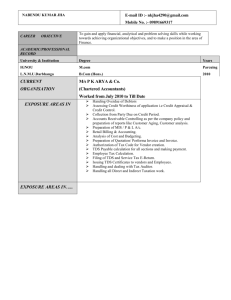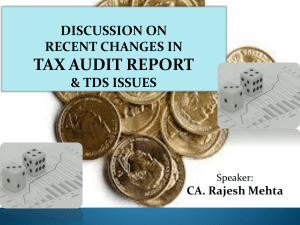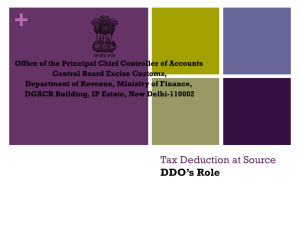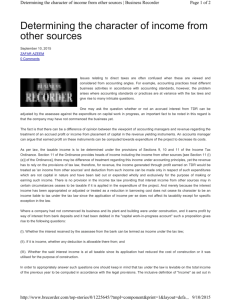Select Posers
advertisement
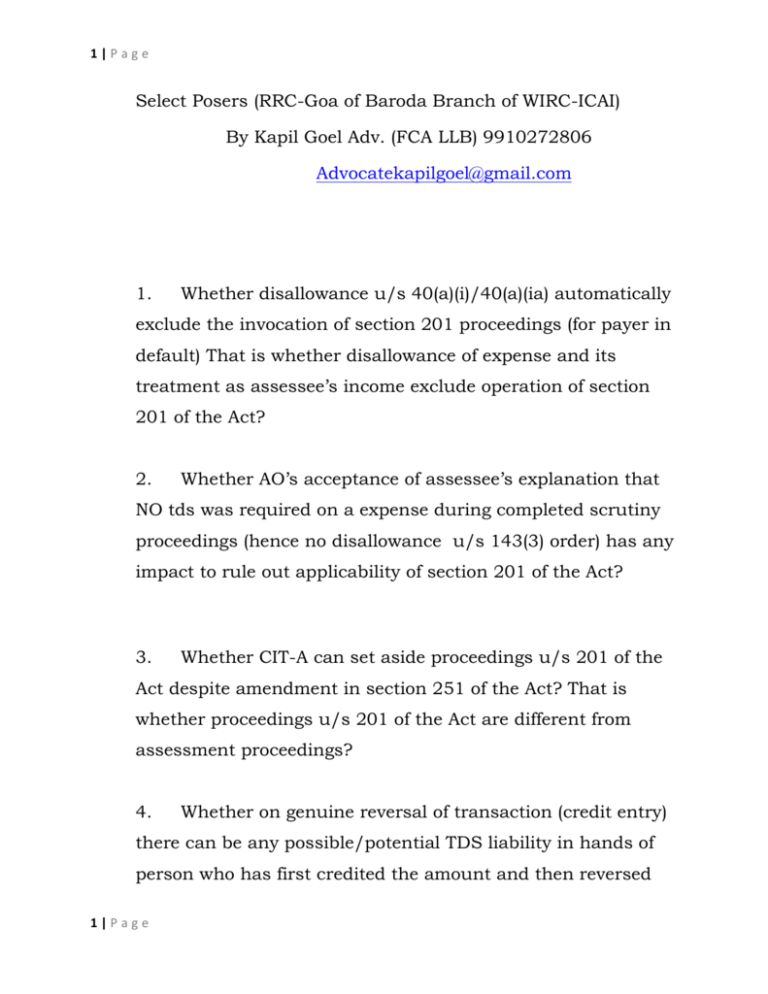
1|Page Select Posers (RRC-Goa of Baroda Branch of WIRC-ICAI) By Kapil Goel Adv. (FCA LLB) 9910272806 Advocatekapilgoel@gmail.com 1. Whether disallowance u/s 40(a)(i)/40(a)(ia) automatically exclude the invocation of section 201 proceedings (for payer in default) That is whether disallowance of expense and its treatment as assessee’s income exclude operation of section 201 of the Act? 2. Whether AO’s acceptance of assessee’s explanation that NO tds was required on a expense during completed scrutiny proceedings (hence no disallowance u/s 143(3) order) has any impact to rule out applicability of section 201 of the Act? 3. Whether CIT-A can set aside proceedings u/s 201 of the Act despite amendment in section 251 of the Act? That is whether proceedings u/s 201 of the Act are different from assessment proceedings? 4. Whether on genuine reversal of transaction (credit entry) there can be any possible/potential TDS liability in hands of person who has first credited the amount and then reversed 1|Page 2|Page the said entry due to genuine reasons (like wrong punching at first instance?) 5. Whether onus u/s201(1) is on revenue to prove that they are not able to recover the tax from payee before approaching payer for TDS demands? 6. Whether penalty u/s 271C (or section 221) of the Act can be imposed for delayed payment of TDS specially where during TDS survey assessee suo motto accepted stated default and paid necessary amounts immediately after TDS survey? 7. In respect of the personnel expenses. assessee and S Limited recognized that they would require certain common human resources. Assessee agreed that instead of these individuals being duly employed, S Limited would employ them. However, the services of these employees would be availed by both the entities on need basis and costs expenses in respect of these employees (including salary,incentives based on terms of appointment, mobile phone expenses) were initially disbursed by S Limited after deducting appropriate taxes. However, to the extent that these persons rendered services to it. ASSESSEE have reimbursed the costs to S Limited at actuals (cost to company basis) without any mark-up. S Limited did not make available, supply or furnish the services of these personnel to us. While working with us, the employees were 2|Page 3|Page working under the direct supervision and control for their work and the intention of S Limited was never to provide any services to us. Whether revenue can insist assessee deduct TDS u/s 194J on payment to S Limited? 8. With respect to the contract work receipts, TDS was done but the assessee claimed credit of the tax mentioned in the said TDS certificates , the assessing officer , in the assessment orders of both the firm and the company, refused to give credit on the ground that some of the TDS certificates belong to the joint venture and some other TDS certificates are in the name of Directors and do not relate to the assessee firm/company. Aggrieved thereby, the present appeals under Section 260-A of the Income Tax Act, 1961 have been filed contending: a) that the credit for TDS given on the TDS certificates produced in the names of the Joint Venture is not in accordance with Rule 37-B A of the Rules framed under the I.T. Act. b) The assessee is not eligible for TDS credit on the certificates produced in the names of the Directors when the same is not in accordance with Rule 37-B A of the above Rules Whether revenue is right? 3|Page 4|Page 9. Whether an application under section 195(2) to Assessing officer (TDS) can be made where payer believes no amount (nil amount) is chargeable to tax in hands of non resident recipient? 10. Whether issuance of equity shares as a consideration for royalty/fees for technical services constitute income u/s 5 read with section 9 of the Act in hands of non resident recipient so as to attract tax withholding u/s 195 of the Act? 11. Whether after amendment to income tax act in section 9 by Finance act 2010 (vide explanation thereto), under DTAA/tax treaty also, the test of place of rendition and performance of service has lost its total significance? 12.Whether payment of salary to non resident employee working abroad and receiving salary abroad, albeit working for benefit of Indian company, can be charged to tax u/s 5(2) read with section 9(1)(ii) of the Act? 13.Whether payment of product registration expenses to overseas autonomous organization for enabling exports/sale in that country constitute taxable income u/s 9 of the Act? 14. Whether mere constitution of permanent establishment/PE under DTAA is sufficient for total taxation to activities unrelated to Indian PE of foreign entity? 4|Page 5|Page 15. Whether in a case where there is no taxability in hands of foreign company under the act and or DTAA, is there any requirement to file ROI u/s 139(1) of the Act? 16. Whether for purposes of TDS u/s 195 of the Act, professional service rendered by foreign professional (independent person/individual) say from Hongkong (where no DTAA is there) are these services different from technical services for purposes of taxation u/s 9(1)(i) of the Act so as to be taxed on basis of professional connection in India? a. Whether for purposes of TDS u/s 195 of the Act, where DTAA benefit is given by payer to payee at TDS stage, Tax residency certificate under rule 21AB is must (section 90(4) of the Act? b. Whether for purposes of TDS u/s 195 of the Act, for purposes of taxation u/s 9(1) of the Act, what shall be the treatment of following services: a) Procurement assistance services ; referral fees; commission for procurement of orders; b) assembly, disassembly, inspection, reporting and evaluation of plant & machinery; c) Lab testing; Training to experts (like pilots); d) Arbitration fees paid to overseas business chamber 5|Page 6|Page c. Whether for payment to Non resident seller of immovable property for which capital gains is taxable in India (as property is in India) can seller take into consideration cost and indexation factors in hands of seller for computation of requisite TDS u/s 195 of the Act without approaching AO u/s 195(2) of the Act? d. Whether for approaching CIT u/s 248 for declaration of TDS it is must that there is first hand adjudication by AO u/s 195 of the Act or straightway a payer can go to CIT u/s 248 on fulfillment of given conditions? 6|Page 7|Page Some Case Studies 1. During the applicant had produced the reality show’ (‘the show’). As per the format of the show the shooting was to take place outside India (primarily in Argentina). For the purpose of show the programme outside India the applicant has engaged XYZ Argentina for providing line production services in Argentina and for that purpose an agreement in the form of DEAL MEMO for production services agreement was entered into. XYZ Argentina is a company incorporated in Argentina and is a tax resident of Argentina. The applicant makes payment to XYZ Argentina for the line production services rendered in Argentina. questions:i) Whether the payments made by the Applicant towards line production services provided by XYZ Argentina in accordance with the agreement entered into with the Applicant is in the nature of Fees for Technical services (‘FTS’) within the meaning of the term in Explanation 2 to clause (vii) of section 9(1) of the Act? ii) Whether the payments made by the Applicant to in XYZ Argentina respect of provision of equipment and services are in the nature of ‘Royalty’ within the meaning of the term in Explanation 2 to clause (vi) of section 9(1) of the Act? iii) If the answer to Question (i) or (ii) is not in the affirmative, whether the payments made by the Applicant to XYZ Argentina for availing the line production services under the terms of the Agreement would be charged to tax as per the provisions of section 9(1)(i) of the Act? iv) Based on the above, would the receipts by XYZ Argentina from the Applicant suffer withholding tax under section 195 of the Act, and at what rate? 7|Page 8|Page 2. A company in surat engaged in business of diamond trading etc enters into an agreement with a manufacturer of machine at China for installation of a machine to be used for diamond assorting at surat. Two types of payment are made: i) one upfront lumpsum payment (non refundable at the time of machine installation) ii) payment on basis of no. of diamonds being assorted (per piece payment) ; What shall be taxability of the both? 3. An event management company in Delhi organizing a big show involving number of German delegates in Delhi, enters into an agreement with German company who will arrange a team of German chef (4-5 people) who will come to india and supervise/observe the quality of food in event at Delhi (that is it is accordance with german standards). Now payment for such services are made by Indian event management company to German Company, what shall be the taxability of the same? 4. A French company (FCO) engaged in providing technical services enters into a contract with Indian co. (ICO) for supervision of its plant construction in india. FCo requires engineers for this contract/job. FCO enters into further contract with a US Company (USCo) whose business is to arrange technicians from globe and provide the same to companies who require them. USCo sends technicians to FCO and FCO uses their services in India for execution of its contract with ICo. Now Payment made by ICo to FCo is taxable in India for stated contract for which FCo is paying due taxes as per Indian laws. Technicians working with FCo are its employees working on Indian contract. Payment made by FCo to USCo comprises for sending /recommending/arranging or stage managing the technicians. Whether it is fees for 8|Page 9|Page technical services u/s 9(1)(vii) of the Act and if it is business income whether technicians working in india with FCo can constitute business connection/PE of USCo in India? 5. The assessee before us is engaged in the business of manufacturing and trading of tooth powder, tooth paste, tooth brush and other health care products. . The assessee had made the payment of Rs 11,71,826 to British Dental Health Association(BHDF) towards accreditation panel fees. BDHF is a UK based registered charitable institution. This Foundation is stated to, inter alia, "evaluate consumer oral health care products to ensure that manufacturers' product claims are clinically proven and not exaggerated" and "an independent panel of internationally recognised dental experts" is stated to "study all the claims carefully to make sure they are true, and backed up by reliable scientific evidence". As a result of the accreditation granted by the BDHF, the assessee is allowed to use this fact of BDHF approval in the marketing of its products. The question that we actually need to decide is whether the amount so received by BDHF, in consideration of the accreditation, can be brought to tax in India? 6. An assessee in India engaged in textile business availed the services of a fashion designer who working at abroad and sends to Indian company recent fashion trends. The fashion designer is of Ukraine and Thailand. Comment on the taxability of the same under the Act and DTAA. 7. An assessee calls an engineer from Singapore to repair the machinery in India for 5-10 days. The engineer claims two payments one reimbursement of travel; boarding and lodging and second repair charges for his very short professional visit. Comment on the taxability of the same under the Act and DTAA. 9|Page 10 | P a g e 8. Whether payment for advertising in foreign media and payment to Google and yahoo for online advertisement are chargeable to tax in India. 9. Whether for purposes of section 194J and section 194C, payment of AMC (annual maintenance charges) for computer repairs; attending seminars; lab testing shall fall under section 194C or section 194J? 10 | P a g e
